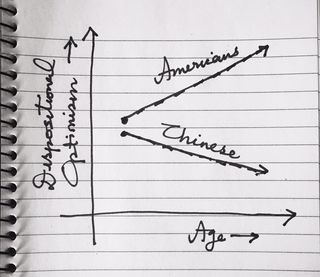Optimism
Do We Become Less Optimistic As We Grow Older?
Research shows that optimism declines with age, but not for older Americans.
Posted July 24, 2016
“The man who is a pessimist before 48 knows too much; if he is an optimist after it he knows too little.”—Mark Twain
“I am so far from being a pessimist… on the contrary, in spite of my scars, I am tickled to death at life”—Eugene O’Neill
Optimism is a uniquely human ability. It requires thinking about the future, imagining it vividly, and predicting what it will be with a positive outlook, even if these ideas are biased and unrealistic. Optimism means that you have a rosy future world-view, believing that your future will be better than your present. Neurosciences professor Tali Sharot calls it “mental time travel” and social psychologists define a person’s optimism as “generalized positive expectations for the future.”

It is natural that we should be optimistic when we are young. Endless possibilities for work, romance, exploration, and achievement lie before us. Physical and mental stagnation and decline seem an eternity away.
But then the years pass and time takes its toll. Whether self-inflicted or delivered by someone or something, we all receive hard knocks from time to time. In his inimitable way, Mark Twain points out one consequence of all these hard knocks. His quote implies that with age, we become jaded and embittered, gradually losing our sense of optimism. But the opposite could also be the case as expressed in playwright Eugene O’Neill’s quote. It could be that as the years pass, we will maintain our sense of wonder and humor, and our hopes for the future will even grow stronger each year.
So which of these two narratives has more credence? How does our optimism level change as we grow older?
The current view in psychological research as a whole, seems to favor Mark Twain’s assertion. A number of studies show that with age, people become less optimistic about their future, and tend to believe that their lives are in gradual decline that will only accelerate with age. In one 2013 study in the journal Psychology and Aging, for example, the authors studied 11,131 Germans across the age spectrum over a span of 11 years. The results showed that on a 10-point scale, young adults rated their future life satisfaction (“How do you think you will feel in 5 years?”) at 7.27, whereas middle-aged adults only gave 6.45, and older adults provided a rating of just 6.14, more than one whole point lower than the young adults. In the authors’ own words:
“We found that from early to late adulthood, individuals adapt their anticipations of future life satisfaction from optimistic to accurate, and from accurate to pessimistic.” (p.258).

Another study conducted with older adults aged between 70 and 104 years concluded that “with each additional year lived, older adults made fewer plans for the future and were less optimistic. For very old adults, this decreasing level of positive future perception represents a highly realistic view that might be more appropriate and functional than having an overly positive and rather unrealistic outlook for the future.” (p. 385)
It’s not that hard to figure out why growing old, especially past 75 or thereabouts, should lower a person’s optimism. There are at least three reasons. First, the realization that the time one has left on this earth is limited and is ticking away rapidly will become more prominent in one’s thinking, creating a dark cloud about what to expect in the future. Second, each hard knock, whether it is getting laid off, getting a divorce after a long marriage, or suffering a physical set-back like a heart attack or a broken hip will take its toll. One study of people in their sixties found that those who experience negative life events had significantly lower optimism three years later. Third, and perhaps most importantly, with every creaking joint and painful spasm, with each childhood friend’s demise, and with every occurrence of a forgotten fact or memory lapse, the future may seem more ominous.
Interestingly, this declining optimism pattern doesn’t occur for everyone.
The new is not all bad. Recent research studies paint a nuanced picture of the relationship between age and optimism. Not every person becomes less optimistic as they grow older. Some people actually grow more optimistic and hopeful about their futures. And this trajectory depends on individual and cultural factors.
Culture plays a big role. Americans tend to become more optimistic as they grow older, while the Chinese become less optimistic.

In today’s fear-laden environment, where the media constantly reports torrents of bad news, this may sound surprising. But in a recent study conducted by psychologists Jin You, Helene Fung, and Derek Isaacovitz, the authors compared differences in dispositional optimism between Chinese and American adults aged between 18 and 84 years. What they found was a stark cross-cultural difference in how optimism changed with age. For Americans, optimism increased with age. But the Chinese became less optimistic as they grew older (see adjoining figure).
Why? The authors argued that the American culture emphasizes values that motivate people to pay attention to positive information about themselves and the environment. (The current media doomsday frenzy may be a fluke). As such experiences accumulate, the positive worldview increases Americans’ expectations that good things will happen to them in the future. The Chinese, on the other hand, are culturally attuned to maintaining harmonious social relationships. Sticking out is discouraged and attending to others’ needs is valued. Over time, negating the self for others’ benefit again and again has a souring effect, making the Chinese less optimistic as they grow older.
This discussion about age and optimism skirts two important questions. Are there health benefits to being optimistic? Or is it better to have a more realistic view about the future, even if that view is bleak and ominous? I will deal with these questions in my next blog post.
About Me
I teach marketing and pricing to MBA students at Rice University. You can find more information about me on my website or follow me on LinkedIn, Facebook, or Twitter @ud.


